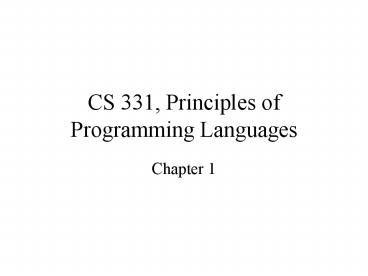CS 331, Principles of Programming Languages - PowerPoint PPT Presentation
Title:
CS 331, Principles of Programming Languages
Description:
CS 331, Principles of Programming Languages Chapter 1 Objectives To introduce several different paradigms of programming To gain experience with these paradigms by ... – PowerPoint PPT presentation
Number of Views:89
Avg rating:3.0/5.0
Title: CS 331, Principles of Programming Languages
1
CS 331, Principles of Programming Languages
- Chapter 1
2
Objectives
- To introduce several different paradigms of
programming - To gain experience with these paradigms by using
example programming languages - To understand concepts of syntax, translation,
abstraction, and implementation
3
Paradigms of Programming?
- There are several ways to think about
computation - set of instructions to be followed
- set of expressions to be evaluated
- a set of rules to be applied
- a set of objects to be rearranged
- a set of messages to be sent and received
4
Some Programming Paradigms
- Procedural
- examples C, Pascal, Basic, Fortran
- Functional
- examples Lisp, ML
- Object-oriented
- examples C, Java, Smalltalk
- Rule-based (or Logic)
- example Prolog
5
Why so many?
- Most important the choice of paradigm (and
therefore language) depends on how humans best
think about the problem - Other considerations
- efficiency
- compatibility with existing code
- availability of translators
6
Models of Computation
- RAM machine
- procedural
- Directed Acyclic Graphs
- Smalltalk model of O-O
- partial recursive functions
- Lisp and ML
- Markov algorithms
- Prolog is loosely based on these
7
Lots of Languages
- There are many programming languages out there
- Lots of other PL-like objects
- document languages, e.g. LaTeX, Postscript
- command languages, e.g. csh, MATLAB
- Markup languages, e.g. HTML and XML
- specification languages, e.g. Z, UML
8
Translation
- Compilation
- Translate into instructions suitable for some
other (lower level) machine - During execution, that machine maintains program
state information - Interpretation
- May involve some translation
- Interpreter maintains program state
9
Trade-offs
- Compilation
- lower level machine may be faster, so programs
run faster - compilation can be expensive
- examples C (and Java?)
- Interpretation
- more ability to perform diagnostics (or changes)
at run-time - examples Basic, UNIX shells, Lisp
10
Web resources
- Programming language research
- http//www.cs.cmu.edu/afs/cs.cmu.edu/
- user/mleone/web/language-research.html
- Free compilers and interpreters
- http//cuiwww.unige.ch/OSG/info/FreeComp/fc/catego
rie.html

